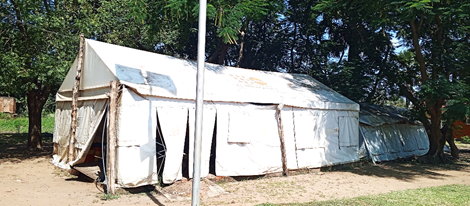Graduation to a Self Help Group—Kalgiri Agri-Forestry Subproject in Koboko District
Under the DRDIP of SENRM – Kalgiri Forestry Sub-project received 45 million that benefited 76 beneficiaries in 2019 (40 women, 36 men). The funds were used to plant 12.5 acres of various tree species that included; eucalyptus, white oak, musizi (lightwood), and fruit trees (avocadoes, papaws, oranges, guavas, etc.). The project design allowed for intercropping with food crops like simsim and rice at the early stage. The group also included a component of Apiary with 6 beehives that have so far produced 6 Kg of honey. Apart from the income received from the honey, the bees also support cross-pollination.
The 76 sub-project beneficiaries worked as a group for 54 days on the tree planting., then they were sub-divided into smaller savings and loans groups that adhered to the five core principles of DRDIP (meeting frequently, collective savings, borrowing for business, paying back, and record-keeping). The goal was that they would graduate to Self-Help groups after completing the 54 days of tree planting and become eligible for the next level of support through the DRDIP Village Revolving Funds (VRF). The beneficiaries also planted fruit trees in their homes as part of the requirements of the project which were managed by the members themselves at the household level.
The members were also taught the DRDIP co-responsibility requirements which include; sanitization measures at the household level like pit latrines, racks for drying utensils, and others like immunization for children and enrollment of their children in school. The project dispatched CBAs (Community Business Agents) to train the beneficiaries and assist them in the process of graduating to Self-Help Groups (SHGs) who can then benefit from VRF.
Alex Cangiga, the Community Facilitator in Koboko spoke about how the genesis of the sub-projects:
“We first mobilized the community and villages through the village structures and through their leaders like the elders and LC1 chairmen. We then went through a process of sensitization about DRDIP and the selection of beneficiaries according to community targeting and wealth ranking. After the groups were formed, they set up their ‘’community project management committees” (CPMCs) led by a Chairman, Secretary, and Treasurer. The groups themselves were trained in the community procurement guidelines and procured the seedlings from prequalified suppliers from the district. The land used was donated by the community or a particular member of the community and land consent forms were signed to record the agreement to donate the land. We ensure that when land is donated for a DRDIP project, the whole family must be available and must be informed of the benefits of doing so. The species of trees selected is also matched to the land and soil where they are planted. Where we lost trees, the National Forest Authority (NFA) donated seedlings for replacement of those seedlings that did not survive.”
Before being graduated to Self-help groups, the SENRM groups are monitored for 9 months. Beneficiaries are required to save from their own resources 1,000 shillings a week in adherence to DRDIPs five core principles. The groups also engaged in produce buying and selling with the crops they intercropped with the tree seedlings. The CGA agents came to train them on the graduation requirements and procedures which included; how much was saved, utilization of their 1,500 mandatory savings from their tree planting earnings, group meeting minutes, and adherence to the co-responsibilities. It is required that eighty percent of mandatory savings must come from their weekly savings as a group.
Kalgiri Agri-forestry graduated from a SHG and funds of 55,500,000 were transferred to the group in June 2022. Their chosen enterprise is livestock and produce buying and selling. At the time of the interview, they were yet to begin accessing the funds. A total of three groups under the component of SENRM in Koboko Districts had graduated to a self-help group in addition to others under the LSP component.
Aukwe Saya, one of the members testifies: “I am so happy with DRDIP. I have benefited a lot from the project. I was among the poor of the poor but now I have moved up and I am now in the category of the middle or active poor! I have been able to do activities to get earn money. I have received knowledge about managing money, the environment, energy-saving stoves, and training on how to save. I managed to get 216,00 from the 54 days I worked which I paid school fees for my children, boat a goat and that goat has delivered a kid goat. We were also motivated to work tirelessly to make the trees survive.”




Comments
Post a Comment